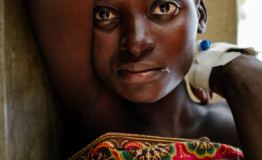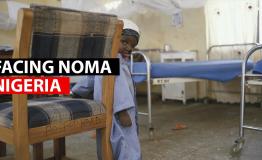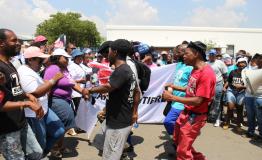We run one of our biggest operations worldwide in Nigeria, Africa’s most populous country, assisting people affected by violence and displacement, improving the health of mothers and young children, and running specialist services for neglected diseases such as noma. In addition to running regular basic and specialist healthcare activities, we respond to disease outbreaks and other emergencies.
Violence and displacement
Northeast Nigeria
Northeast Nigeria, particularly Borno state, has endured more than a decade of armed conflict between the government and non-state armed groups. People living in areas controlled by armed groups have no access to humanitarian assistance.
Around 1.6 million people are displaced in Borno, and some 30,000 families live in the state capital, Maiduguri. In 2021, the authorities began to close displaced persons camps in Maiduguri and encouraged people living in them to return to their home regions.
In Maiduguri, MSF continued to provide lifesaving specialist healthcare to children under 15 years old in Gwange paediatric hospital. During the malaria peak, we expanded our capacity by conducting additional consultations for malnourished children at a 120-bed nutritional feeding centre. We also offered basic healthcare to displaced people living in five informal camps in Maiduguri.
We were forced to close our operations in Gwoza and Pulka towns in August, due to a deterioration in the security situation in the area and threats against humanitarian workers. However, we continued to run a 20-bed inpatient facility in Ngala hospital and support outpatient and inpatient services in Gamboru maternal and child health centre. MSF-trained health workers also conducted community-based consultations in Ngala and Rann.
Northwest Nigeria
Ongoing conflict between herders and farmers has displaced more than 530,000 people in Nigeria’s Northwest. In addition, criminal gangs increasingly engage in killings, looting and kidnappings for ransom, especially of schoolchildren.
In Zamfara, we continued to run our 130-bed children’s hospital in Anka and provided medical care to displaced people living in the town. We also worked in two hospitals in Shinkafi and Zurmi, supporting therapeutic feeding centres, inpatient paediatric care, mental health consultations and treatment for victims of sexual and gender-based violence.
After more than 11 years of activities, we handed over our lead poisoning project in Zamfara to state authorities at the end of 2021. Exposure to lead, caused by unsafe mining practices, had caused the deaths of hundreds of children. Following a successful multi-sector approach that includes medical treatment to remove lead from the body, environmental remediation of lead-contaminated areas and promotion of safe mining practices, no more children are dying of lead poisoning in the area.
In Katsina, MSF started to work with the Ministry of Health in July to address alarming levels of acute malnutrition among children and support outpatient therapeutic feeding centres in four basic healthcare centres in Jibia local government area. In September, we opened a new inpatient therapeutic feeding centre in Katsina city.
Central Nigeria
Intercommunal clashes between herders and farmers led to further waves of displacement in Benue state in 2021, and more than 220,000 people were living in dire conditions in informal camps with limited access to healthcare, food, water and sanitation by the end of the year. To address the immense needs, we run two basic healthcare clinics in Mbawa and Abagana camps, offering outpatient consultations, ante- and postnatal care, nutritional support, health education and care for victims of sexual violence. In June, we started supporting newly displaced people in Ortese camp by running mobile clinics, constructing toilets and showers, and distributing water and mosquito nets.
Responses to disease outbreaks
Cholera
In 2021, Nigeria experienced the worst cholera outbreak in a decade, affecting most of the country and killing around 3,600 people. MSF emergency teams worked alongside the Ministry of Health to bring the outbreak under control, opening cholera treatment centres in Bauchi, Borno, Kano and Zamfara states, launching vaccination and health promotion campaigns and improving water and sanitation services.
Lassa fever
In Ebonyi state, Lassa fever – an acute haemorrhagic illness – is endemic. Our support to the local and national health authorities consists of technical assistance, staff training and providing treatment at a hospital in Abakaliki.
General and specialist healthcare programmes
Sokoto
In Sokoto, we support treatment for noma, a neglected disease that mainly affects young children. It starts with an infection of the gums, that destroys the bone and tissue of the cheek and nose if left untreated, killing up to 90 per cent of those affected within a matter of weeks. Those who survive are left with severe disfigurements that can only be corrected with extensive reconstructive surgery. In addition to surgery, our team provides physiotherapy, nutritional and mental health support, and conducts outreach activities to improve early detection.
Kano
In Kano, we work in two basic healthcare centres in Tarauni and Ungogo. Our teams aim to reduce sickness and death linked to disease outbreaks and improve care for pregnant women and newborns. In August, we started providing emergency obstetric and neonatal care, and assisting births in Garan Gamawa health centre in Gwale.
Jigawa
Our team offers comprehensive emergency obstetric and neonatal care in Jahun general hospital in Jigawa, which admits around 1,000 women every month. In 2021, we also assisted four centres with emergency obstetric and neonatal care in Jahun, Aujara, Miga and Taura local government areas.
Rivers
In November, we handed over our comprehensive care programme for victims of sexual and gender-based violence (SGBV) in Port Harcourt. Since December 2020, we had supported a total of 1,129 new patients, the majority of whom were minors, and provided follow-up to 1,500 others. Other SGBV-related activities included delivering training in five hospitals and four basic healthcare clinics, and supporting children’s and remand homes with mobile clinics, training for carers, donations of medical supplies and improvements to water and sanitation services.












![Northeast Nigeria: Now is not the time to question life-saving assistance [Photo: Yuna Cho/MSF] Northeast Nigeria: Now is not the time to question life-saving assistance [Photo: Yuna Cho/MSF]](/sites/default/files/styles/card_half/public/msfimages/news/msf281414_medium.jpg?itok=iXo2835f)

![Stone crushing at Bagega gold processing site, Zamfara state, Nigeria. A pilot program to introduce safer mining practices in Nigerian gold mining communities has reduced blood lead levels by 32% . [Photo: Olga Overbeek ] Stone crushing at Bagega gold processing site, Zamfara state, Nigeria. A pilot program to introduce safer mining practices in Nigerian gold mining communities has reduced blood lead levels by 32% [Photo: Olga Overbeek ]](/sites/default/files/styles/card_half/public/msfimages/news/msf116708_medium.jpg?itok=wJsWVyy6)